#interlingue
Note
Tintin from Tintin speaks Interlingue (Occidental)


Tintin from Tintin speaks Interlingue (Occidental)
#yourfavespeaksaconlang#interlingue#occidental#tintin#sorry for the Outline on tintin it was the only way to make him and his black socks look distinct against the background
9 notes
·
View notes
Text
Surely THIS time the new international auxiliary language will resonate with the masses and be adopted worldwide, not like the last one
#esperanto#interlingua#Interlingue#Ido#volapük#occidental#novial#Kotava#Lingua franca#lingua Franca nova#Slovio#Interslavic#Pandunia#Lingwa de planeta#Globasa#Folkspraak
17 notes
·
View notes
Text
Yo es alquant préterfatigat hodie, e mi OCD e ADHD colaborat por far que yo esset durante quelc témpor specialmen impulsiv, quam sovente eveni quande yo es talmen fatigat. Or mi mente es fatigat e alquant plu capabil de devenir prétercargat til quelc gradu. It vermen es important que yo obtene dorme quel es talmen bon quam possibil.
0 notes
Text
me: sees my 100000th rom meme about not wanting love but wanting loveh
me: omgggg sooo trueee!!!
#interlingual (? thats deffo not a word) puns get me every time#also all romani meme pages quit at the same time in july like damn y'all ok?#if smth happened let me know because for a familia i'm ready for a chinga#personal#rrumblr
3 notes
·
View notes
Text
not to sound like your nationalist uncle but i think the americans on the internet (especially twitter) are literally colonizing your brain and you're just letting them
#dont get me wrong i don't think most americans are aware of this#but they have this purist and self centered way of thinking and morals (which is bc of the way they're raised by their system and society)#and i don't want to make this long so basically at the end you start thinking like them too#but i don't mean you share their ideas i mean you start thinking in the purist way they do without even realizing esp if it's about +#a subject previously unknown/little known to you#ok i guess it's notsuper fair to blame it all on the usamericans so let's just say english speaking countries#anyway and the reason that we change and not them is obviously bc english is the universal language rn and you can't speak a language +#without adopting the culture of that language at least a little#etc etc can you see where i'm going with this?? i am all for intercultural and interlingual communication and exchange but +#when this ''communication and exchange'' is only going from culture a to culture b and not from b to a +#isn't that kind of the definition of colonialism? if that sounds too harsh i'm fine with calling it online/softcore colonialism too
0 notes
Text
The Käärijä Research Paper (tm)
aka: Error Analysis of the Use of English Articles in Jere Pöyhönen Interviews in 2023
(Before we start, a couple of clarifications: firstly, I am a linguistics student and this research was my final project for my psycholinguistics course, secondly, this was a group research and I have gotten permission from my friends to share these results with y'all so tysm to them, and lastly, the og work is LONG, 50 pages long, so I'm condensing it into the important bits)
Findings and explanations under the cut <3
Before sharing the actual research, i'm going to share some important terms for you guys to understand the overall layout of this work.
Error analysis: kind of self explanatory, it's the process of analyzing errors, specifically in one's speech, more on how we did this later.
Omission: The alienation of a linguistic form in speech (i.e. I go to (the) supermarket.).
Addition: The opposite of omission, putting an unnecessary linguistic form in a sentence (i.e. It's the maybe half and half.).
Substitution: Exchanging a linguistic form for another one (i.e. He admitted to have stolen a wallet. Instead of: He admitted to having stolen a wallet.).
Overgeneralization: Looking at a grammatical rule and thinking it applies to every case with no exceptions (i.e. finding out verbs conjugated in the past end in -ed and creating conjugations like writted instead of written). Also known as intralingual transfer.
Negative transfer: When your mother tongue (L1) seeps into your second/foreign language (L2) (in this case it's foreign language, but I'll still call it an L2 for simplicity's sake), if we're talking about Spanish negative transfer it can look like: the car red (Spanish adjectives go after the noun, unlike in English). Also known as interlingual transfer.
Local error: An error that does not affect the overall meaning of the sentence, making it still understandable.
Global error: An error that affects the overall meaning of the sentence, making it difficult to understand without clarifications.
Okay, with that out of the way, let me explain what we did:
We decided to make an error analysis on how Jere utilized articles (the, a/an) throughout 2023, for this we considered 2 interviews and 1 Instagram live, the interviews were: KÄÄRIJÄ TRIES LITHUANIAN FOOD (uploaded on 12/04/23) and Episode 3: Käärijä and friends (uploaded on 26/12/23), the ig live was the one he did to promote the release of Huhhahhei on 19/10/23, the dates are important for later.
Now, to do the error analysis in itself we followed Rod Ellis’ proposal for error analysis which follows four main steps:
Identifying errors: Self-explanatory, you see what errors one has committed.
Describing errors: Once you see the errors, you describe what exactly the error is, it can be with grammatical categories, or with omission, misinformation, addition, misordering, and substitution.
Explaining errors: After describing the error you need to explain why this error was committed, the two main ways are through overgeneralization and negative transfer.
Error evaluation: After all this, you identify how the error affected the overall message of the sentence being spoken, was it local or global?
We put these steps into a chart and listened to the interviews and identified the errors we found, it’s a really long chart, so if you want to see it fully you can find it here (hopefully). After identifying all the errors and doing our own error analysis we… well, analyzed the data, duh, according to the objectives we set up for the research.
Our first objective was to identify errors Jere has committed regarding articles in the three videos I mentioned. What we analyzed was more grammatical, so what grammatical structure he used the most. He usually omits an article before a noun and with adjectives, like in: “We go to bar with my producer…”, or “Käärijä goes to boat.”, or “I am fine, uh… little bit tired.”. Obviously, this is kind of expected because Finnish does not have articles, but he also adds articles when it is not necessary, like in: “I have the one festival.” Here are the charts of the grammatical trends:
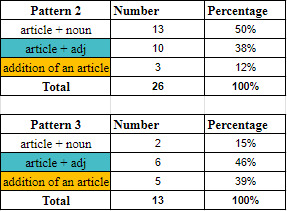

Then we focused on the describing errors part of our analysis. In this part, we found out that he usually finds himself committing omission errors, with 67 in total across the three videos, like I said before, expected, however, the second most common error is addition, this means he adds an unnecessary article in a sentence, and what’s interesting is that he usually does it with the article “the”. Since this is not an actual academic article I will speculate with a full chest: I think he does this because people are usually taught that “the” is the only article in English (only definite one, but not the only one), and that nouns usually have an article accompanying them, so I think that he adds the when he is unsure if an article needs to go there or not. Finally, there was only one case of substitution: “This is the lovely story.”, not really sure why he did this, but it’s interesting that it only happened once. Have the charts and graphs:
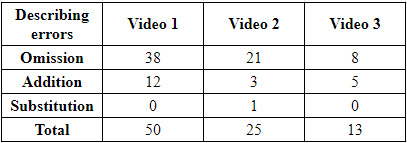
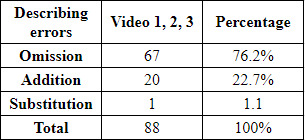
We moved to the next step: explaining errors. When we started this research, we thought that we would only have negative transfers since, ya know, Finnish grammar and all, and we were kind of right? He has committed negative transfer errors the most, with 66 in total, but he also had 23 overgeneralization errors, which I didn’t really expect to happen with articles that much. Not much else to say here, have charts:

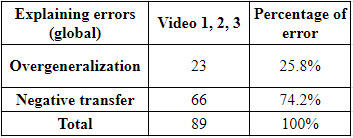
Lastly, error evaluation. He made mostly local errors, which is what mainly characterizes his speech, we know what he’s saying, he just usually lacks some grammatical form that doesn’t affect his overall meaning. He did have 15 global errors that unless you have the context, it can be a little confusing to understand what he’s trying to say (like in the ig live he said “here tour” when he wanted to say “here in the tour”). Charts!

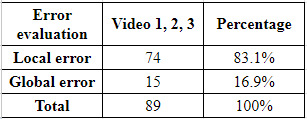
Our final objective was to see the evolution of these errors, has he made more or less as time went on? Well, since we all can see and hear, he has made a great improvement! You already have the charts above to understand that, but I just have to explain it. In the first interview, in April, he made 50 mistakes in total, by the ig live he had cut those in half, and by the latest interview he gave in English he had cut the mistakes in half again! Have the graphs to accurately see this:
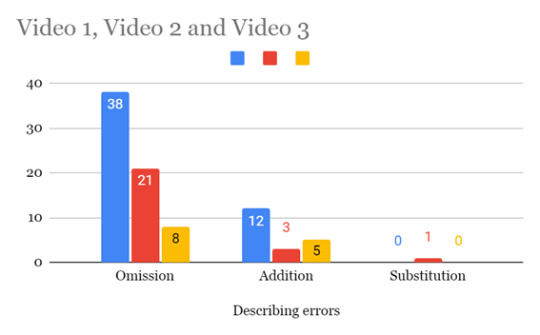
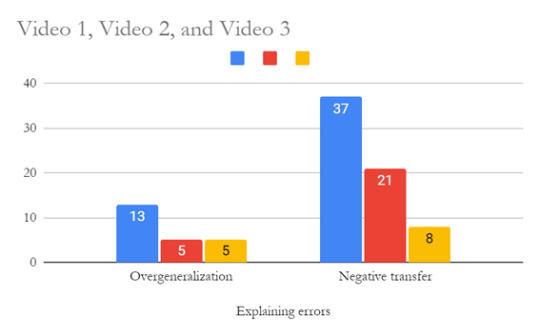

He has improved so much in such a short amount of time! Even more impressive when he hasn’t really taken any formal English classes, just by talking to Bojan and Alessandra. There’s a difference between language learning and language acquisition that was proposed by Stephen Krashen (cool dude, if you’re interested in language learning, go check him out). He says that people usually learn more by acquiring (unconscious) rather than learning (conscious), and you can see that Jere has learnt so much by acquiring English through his friends and his own experiences! And this is just looking at how he uses articles, there is also a distinctive change in how he uses other grammatical forms (but that was too much work for just 2 weeks, maybe I’ll do it later, no promises on anything, though). Even if we’re not talking about his grammatical and syntactical forms, his pronunciation has improved as well! My friends were fascinated by how his accent seemed to develop from video to video, which was very sweet because his accent is one of my favorite things about his speech, but that’s off topic.
The general takeaway from this research is: Jere still has a lot of Finnish tendencies in his English, he has developed his own grammatical structures to communicate in English, and how much he improved in an 8-month period is kind of insane, especially for an adult (who are the age group who have the most trouble learning languages). He’s the it-girl of blowing off a linguist’s mind (me, I’m the linguist)
That would be all!! If you have any other questions, feel free to ask! I'm more than glad to answer them
#hope you enjoy reading this!!#anyways i was supposed to work on my slides to present this to the class tomorrow but...oh well#priorities#i also hope this made sense lmao#käärijä
197 notes
·
View notes
Text
A jar
Vasily x gn!reader
Enjoy!
With his 180cm of pure height, even the highest shelves were no problem. Especially in Japan, where everything seemed to be unnaturally low to him (ESPECIALLY door frames). And that's why he watched with fascination a live documentary named "struggles of short people".
Or it could have been a matter of their astonishing stubbornness to stretch themself towards the desired jar for 10 minutes rather than go for some box, let alone a ladder. Surely, if it wasn't for the fact that the jar was made of glass, they would have knocked it off a long time ago with a nearby broom. Instead, they had to limit themself to merely brushing it with the very ends of fingertips.
From his seat, Vasily could see that the vessel was indeed approaching the rim, threatening to fall at any moment and kill them. It was this thought that activated the primal need to protect what was close to him and motivated him to move from his place.
[Y/N] just stopped unsuccessful attempts, finally ready to reach for anything to stand on. However, seeing Vasily walking towards them, hope shone in their eyes.
Russian looked at them softly, reached for the jar and without any problems moved it to the very back of the shelf. Having ensured the safety of his partner, he returned to his duties around the house without worries.
He wasn't sure exactly what they said in Japanese behind his back, but he was 90% sure it was "fuck you". Some phrases are interlingual.
#Vasily being little shiet#i mean not so little#but u know what i mean#vasily#vasily golden kamuy#vasily pavlichenko#golden kamuy vasily#vasily pavlichenko x reader#golden kamuy#golden kamuy x reader#never enough golden kamuy#never enough my stories#scribbles!
41 notes
·
View notes
Note
heavymedicspy? Language loves.
They'd all end up speaking fragments of each other's mother tongues and making all sorts of interlingual inside jokes.
They end up speaking this odd mix of German-Russian-French that literally no one understands
#tf2#team fortress 2#tf2 headcanons#medic tf2#tf2 medic#spy tf2#tf2 spy#tf2 heavy#heavy tf2#i really need a name for their polycule
34 notes
·
View notes
Text
still vodwatching Bagi
first time seeing some of the details in Roier's city

that's czech on those boxes.



damn that internationality/interlinguality extends past the languages that are spoken on the server, huh? /j
12 notes
·
View notes
Text
but love pushes us along...
–Jennifer Wilson, in her book review titled "J. M. Coetzee’s Interlingual Romance" on J. M. Coetzee’s The Pole (The New Yorker, Sept 25, 2023)
14 notes
·
View notes
Text
when i was younger and hung out around my uncle a lot more than i do now, i remember whenever he referred to things regarding his native heritage, he always just called it "indian". called himself an indian, called the words he taught us indian, so on. since i was a little kid who didn't know any better, i didn't know that "indian" in the context of indigenous americans was a very broad, frankly bastardized term to paint a vast variety of cultures spanning two whole damn continents with one brush. it only occurred to me as i got much older than i was at the time that there'd be more than one "indian" language, and up until now since i had no idea what tribe(s) he even is i couldn't even begin to know where to look unless i found a download of every goddamn interlingual dictionary available and painstakingly checked every godddamn one for what their word for "thunder" is
the word he taught us meant thunder was hiloha. i didn't even know how to spell it until now, because he only ever said it aloud. literally just a few minutes ago, i decided to ask my grandma (his sister) if we knew what tribe(s) he belonged to. and apparently he's a mix of choctaw and makah. which gave me a lead, which led to me finding a dictionary on libgen, which led to me word searching "thunder" in the choctaw to english dictionary. it's the only word i remember him teaching us, and i'm unsure if he ever tried teaching us others. but it was his dogs name, and he was a damn good boy, so i remembered it clear as day. though, they normally shortened it to "hilo".
so, i guess what came out of this is that i now know a bit more about my uncle's heritage, and where to look for more research. so, if you're gonna have a takeaway from this, i'd appreciate it if you remembered the word "hiloha". it means thunder. and aside from being the name of a very good boy who deserves to be remembered, i think it's even more important to remember the histories, cultures, and of course the languages of all the indigenous folks who came before us and did their damndest to preserve their cultures in spite of it all.
#honestly a bit unsure if he was just simplifying it all down for us little idiot kids or not#regardless i think it's an important memory to keep alive#writing this up got me thinking about my time spent over at his place when i was real young. we spent a thanksgiving or two over there#both him and his wife were alcoholics at the time. she probably still is but she's been out of their lives for a while#i remember huddling in the corner with my cousin and my mom while they both fought. i distinctly remember her slapping him over the head#with a TV remote. not a very happy thanksgiving that one#it occurred to me while remembering this that there's definitely some kind of bitter irony to a white woman abusing a native man and his so#on thanksgiving. not even mentioning just a (mostly) native family having a bad thanksgiving in general. a bitter memory all around#god she was a cunt. talked shit about welfare queens and people on food stamps while me and my mom bought her food with our food stamps#claimed to be a vegetarian because how much she loved animals but still regularly ate bacon#i definitely don't remember my uncle being perfect in that relationship but i also definitely remember her being far worse#i'm almost certain it was mutual abuse but there's definitely a reason why my uncle's still in my cousin's life and mother isn't#aside from the fact that she did in fact abandon them and start a new family#as far as i know my uncle's recovered from his alcoholism and she hasn't. which itself wouldn't be a sin if she wasn't also naturally just#nasty piece of vaguely human looking garbage even without the alcohol#the way i understand it alcohol usually doesn't change who a person is at their core. it just amplifies who they already are#my grandpa's a very loving man and while i've never seen him get outright drunk i'm told he's very sweet and cuddly#saying this feels like a bit of a blanket statement but i definitely feel like for the most part if someone is an abusive piece of shit#while drunk they're also a lot more likely to be an abusive piece of shit sober#i've heard that some people are sweet and kind sober and turn nasty when drunk. i've never seen that firsthand but i'm sure it's entirely#possible. i can't speak whether it actually reveals who they really are or what. i'm not a psychologist#im rambling. oh well!#i'm glad that my cousin and uncle seem to be in a better place now. got their shit together#that's what matters
4 notes
·
View notes
Text
I feel like there is some interlingual pun to be made with कागद/когда but i simply do not know what
#langblr#learning languages#languages#russian langblr#marathi langblr#'but they arent pronounced the same' ça va/сова still works despite one ostensibly being in a french accent as it is . french
2 notes
·
View notes
Note
regarding your translation comparison post, i just thought i'd share some translation theory, since i see a lot of stuff like this where OPs are like "why would the translator make these changes??"
on the first point, this is an example of condensation - when you condense the information present in the source text into fewer words in the target text. it's very common in interlingual subtitling and things like comics and manga due to the limited space available. i've also been told by someone who worked in manga for a little bit that typesetters have a rough job in the industry and should be taken into account when translating manga. basically, due to pressure to use fewer words in the official context, "strangled [...] because i'm a snake" was condensed into "constricted", since that word has the nuance of a snake doing it already.
a few of the other points you make are examples of expansion - when you include information in the target text that wasnt in the source text so as to suit the target audience. it's a very common translation technique in japanese to english translation. this is because japanese is a high context language, and sentences that make perfect logical sense to a native speaker, or someone very experienced with the language, would not make sense and/or sound very vague when translated literally - as in the fan translation. now, sometimes vagueness can feel like the more natural option, but i've been told that in the industry it's common practice to basically guess the ends of japanese sentences that lack verbs. of course this depends cus sometimes you would be able to consult the original author and ask what verb they were implying, but this is rare in manga. this is common practice in translation because english - particularly american english, a majority of manga is officially translated into - is a low context language, which is rarely vague in it's execution and most things are spelled out when its used by native speakers.
i cant speak for the bullies talking about hyena boy because i havent seen the source text, but i would like to use the opportunity to express how important context is for translation, and that while manga translators likely have access to the original images, there are some fields of translation where they dont necessarily, particularly video games, or so i hear. this isnt a go at you, this is just something i find people just dont know so yeah.
anyway sorry if you knew all this already so it comes off as condescending, that wasnt my intention. have a good day <3
Don't be sorry, I was not aware of the lack of access to the original source
3 notes
·
View notes
Text
Logophoricity and The Gay Fanfic Problem in my fantasy book
I have been dealing with a lot of pronoun confusion in my wip because there are many intimate scenes between people using he/him as pronouns. Someone on another website linked me to a discussion of the "Gay Fanfiction Problem," which now has me wondering if I can turn my conlang into a logophoric language and use logophoric pronouns in Elvish amid the English for clarity. I would legit do this. I use conlang words in-text constantly.
I am conscious that using conlang words amid English text is a likely source of problems, including turning readers off the book entirely. Avid fantasy readers do have a tolerance for worldbuilding and terminology that readers of other genres would find unforgivably confusing, but I am pushing it already. I've been choosing to use conlang words for specific concepts with no perfect English or historic analog. I do define them. I think they make sense in context. But.
Logophoricity might suit Elvish, in my books called lo:sa'lvaren (with the punctuation indicating diacritics that are hard to type on Windows, sorry). The main quality of lo:sa'lvaren is high bandwidth: it is an information-dense language with a defined spoken vocabulary and an undefined secondary "sung" vocabulary that confers additional information through melody. It would make sense to add info density here, where my native English fails me.
The tl;dr on logophoric pronouns is that you basically have a second version of he/him (for example) that you only use when it's referring to a different he/him than the subject of the sentence (if my understanding of the Wiki article is accurate).
Conceivably, a similar but distinct he/him (ke/kim for example) could be introduced early in dialogue as an alt-pronoun for males in Elvish society and then deployed in-text by the time intimate scenes happen.
I don't think it's likely I'll do this...it's different using words for distinct nouns, like xilcadis to indicate a walled complex of palace and city where only a specific caste can live, versus introducing an entire concept that isn't even linguistically common in any major world language. But I do find the idea of it *terribly* interesting.
The hostility of the Elvish language to readers is part of the purpose, btw. They are meant to feel distant and arrogantly unintelligible at times.
I use language in my books to indicate the hostility of empire. What people speak, what they don't. Who they speak what language with. Who can learn the languages spoken.
There's lo:sa'lvaren, Interlingual, and nachi| most prominently; within lo:sa'lvaren you have tonal and atonal forms, where only the tonal form is ever spoken by the highest caste. It's believed only they have the tongue for it. Interlingual is simplified lo:sa'lvaren, expected of non-elves interacting with the Empire.
Nachi| belongs to the Dwarrow of the Mountainhomes. It's a very friendly language, comparatively. I don't use a ton of nachi| conlang words *unless* it is for a concept that lo:sa'lvaren doesn't have, like the complexity of gender that Dwarrow embrace. (Dwarrow have six genders and sets of pronouns.) It's way easier to read; your eyes skim nachi| and it's close enough to English you can sound it out.
Not so with lo:sa'lvaren; my elves don't even want readers capable of sounding it out.
You can see why, when I think of conlang usage in my books in terms of what is "friendly" to readers in a Doyleist sense and non-High Elves in a Watsonian sense, I might consider secondary pronouns in the narrative. But also then reject it. Because my intimate scenes bring together someone who look like a High and Low elf. All gaps in caste, class, language, etc have been crossed with physical touch, and I want readers to be immersed for those parts.
That said, logophoricity is a brand-new concept to me which I find terribly exciting. Nachi| isn't nearly as developed as lo:sa'lvaren because the reader-friendliest language I can use in-text is English; I could more easily roll logophoric pronouns into nachi| for my own gratification!
I've already got six sets of genders and pronouns. Why not add alternative logophoric pronouns too? A dozen different sets of pronouns widely accepted by a society! That is certainly in line with the ethos I desire to express with Dwarrow. (Btw, on the word Dwarrow)
7 notes
·
View notes
Note
Reina, digo que fue Hangman quien usó frenillos, esa sonrisa que tiene es la prueba y gracias a que tuvo que usar frenillos durante toda su adolescencia, cuando ingresó a la Escuela Naval aún era virgen.
I don't doubt that Hangman still visits the dentist regularly when he is not deployed, I say his smile is the proof.
When you wear braces (I don't know if you did, I did) your whole life and dental hygiene changes forever. You start flossing, using specific sized brushes, interlingual brushes, etc.
After you finish orthodontic treatment, the dentist puts in removable retainers (so you can clean them and your teeth) that can be made of mental or clear acrylic.
These retainers must be worn all your life, forever. Because your teeth want to go back to the position they were in before you wore braces. That's why you should see your dentist at least once every three months to make sure everything is still in order.
I now use metal retainers because after a couple of years of heavy use, the acrylic ones tend to turn yellow or brown, wear out and fracture. Then you have to replace them and as all retainers are custom made to fit your mouth (just like braces), they are quite expensive to make acrylic ones.
Norma! I did have braces! And in my drabble, I would like to think that Jake took good care after he got his removed and that's why his teeth are still so pretty today!
3 notes
·
View notes
Text
Stress
I wanted to decide between fixed and lexical stress for Goblin. To do this, I used my new syllable rules and a website called Gen to generate a bunch of random words and noted down the ones I liked in my spreadsheet. I then went through and pronounced each word, noting the pattern of stress to see if there was one.
Obviously, all one-syllable words were stressed. The two-syllable words were primarily stressed on the first syllable, but 3 out of 39 were stressed on the second. The two-syllable words were primarily stressed on the middle/penultimate syllable, but 4 out of 15 were stressed differently (on the first syllable). I only had 3 four-syllable words, and all of them were stressed on the penultimate syllable.
The majority of words were stressed in the same way (on the penultimate syllable), but enough of them just sounded wrong with that stress pattern that I didn’t want to make it a hard and fast rule. Since Goblin has origins in three different languages, it’s not impossible that each of them had fixed stress, but when combined formed no pattern. When languages form from interlingual communities, the socially dominant class usually determines the grammar, while the common folk define most of the vocabulary. Therefore, I’ll say that most Goblin words are stressed on the penultimate syllable, but words stemming from Old Hobgoblin and Old Bugbear (which would probably be words relating to government, the military, and scholarship) can have different patterns of stress.
4 notes
·
View notes